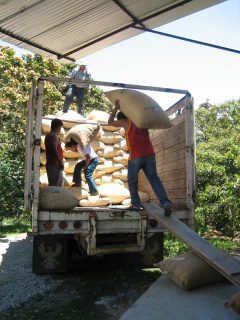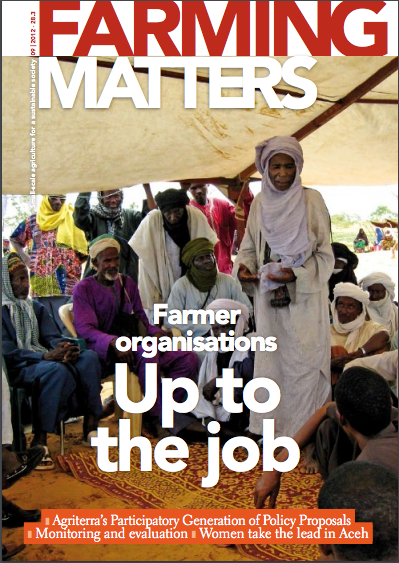In spite of their differences, there are some essential features that are common to all farmer organisations. One of these is the need to find a balance between their interests as a group and the interests of its individual members. How – and when – is this balance found?
Following the framework to analyse the way farmer organisations work that was presented in the June issue of Farming Matters, the Empowering Smallholder Farmers in Marke

ts (ESFIM) research programme is looking in detail at the ways in which organisations handle the tensions between groups and individuals, and is drawing lessons that can help these organisations be more efficient.
Not surprisingly, we’ve found that holding a group together is not easy, and that we all need “organisational intelligence”. The efforts of different organisations in Bolivia illustrate the iterative process that leads to organisational learning.
Quality Assurance Systems
In collective marketing, an organisation will de!ne the terms of trade on the basis of the quality and quantity it can offer. Once a deal is made, the organisation has to ensure that its members’ products meet the defined standards.
“We had problems with members who supplied tarwi (a traditional Andean cereal) of a lower quality. To solve this, we introduced sanctions for those who did this more than once, fining them Bs 100 (or US$ 15). These sanctions are not included in our statutes, but were agreed to in our Assembly. Quality control is done by a specially appointed board member, who has to taste the tarwi and then decide whether to accept or reject the product. To prevent the influence of family ties we had the entire group observing that no bad products were allowed. This group control has been decisive Hard work Finding rules that keep a group together in making the system work. It also helped that we are a small organisation. The first time there is a problem we just give a warning and this usually prevents any problems reoccurring. Sometimes, we have had to impose sanctions, but only a few members have been fined.” (ASAFOP, an organisation in Sucre selling tarwi to school feeding programmes)
Coping with working capital constraints
Most smallholder farmers face cash constraints. Organisations involved in processing, exporting or supplying governments often have to wait several months before they are paid. While every organisation finds it better to pay its members after all the financial transactions have been completed, most members cannot wait that long.
“We have set up a fund with the pro!ts we make, so we pay our members on delivery of the product. We pay one boliviano per pound of product (‘reintegro’) and use the rest to capitalise this fund. Every member pays an annual contribution of Bs 50. Nevertheless, we are looking for ways to get extra funds as we do not have enough working capital. Due to this shortage, we have to accept that members also sell to other buyers: we cannot prevent them selling their alpaca !bre to others as we cannot always pay them in cash. We need to find strategies to solve this. We are thinking of a bank loan or of an additional member contribution, but this will affect all members, so it has to be planned with caution.” (APCA, an organisation on the Altiplano selling alpaca wool)
Anticipating side-selling
There is a serious risk that farmers “side-sell” their produce to competing traders or processors from whom they receive no services or inputs, and with whom they have no monetary obligations. Most organisations need mechanisms to prevent this occurring and avoid losses, or find other ways to recover the costs incurred in providing services to its members.
“It takes a lot of effort to have ‘loyal’ members. Some do not understand that as an organisation we have additional costs that external agents or brokers do not have. We decided that those who did not supply our organisation exclusively would not benefit from the external support or grants we get as a group. But this did not work. Another mechanism has been to try to convince members of the fairness of the price we pay, developing a cost-benefit analysis in a participatory way. We start indicating the price in the market and the costs we have to pay as an association. Then, we look at the pro!t and we define the on-farm price. Until now, we have not been able to !nd an effective mechanism. Fortunately, fewer than 10% of our members need convincing…” (AOCEMM, an organisation in Tarija supplying honey to a national nutrition programme)
Differentiating between services to members and non-members
Most economic organisations need contributions from their members to do business or to provide efficient services. However, members face a number of disincentives to do so. The most common one is free-riding: why contribute when you can get the same services without being a member?
“In our latest Assembly we decided that members would receive a better price than non-members. We hope to implement this decision this autumn, though it may not work. If we had bigger pro!ts we could pay our members higher prices but we don’t have enough money. And we cannot pay less to non-members: they won’t sell to us if we do not pay them more than our competitors. We do a service that differentiates between members and nonmembers: the grain mill. Members pay Bs 0.50 less for each kilo milled in it, so a lot of producers have indicated their interest in joining our association. However, the existing members are hesitant to allow this because they think that new members will bene!t from the mill without having contributed to it. They argue that new members should pay more, but the new ones do not accept this condition.” (APEMAK, an organisation in a remote area of Azurduy that sells cereals to urban traders)
What are your experiences in dealing with such problems? We are interested in stories that show innovative ways farmer organisations have coped with these and similar challenges when marketing collectively. All contributions will be entered into an extensive database of experiences, which will be accessible through a special website, www.collectivemarketing.org, later this year. Please send your contributions, short or long, told as stories or analysed, to: cases@esfim.org. Be part of this crowd-sourcing project!
Text: Giel Ton, Lithzy Flores and Evaristo Yana
This project benefits from financial support from ICCO, IFAD and the Dutch Government and is part of the ESFIM research support programme to national farmer organisations (www.esfim.org), implemented by AGRINATURA (www.agrinatura.eu) through Wageningen UR, CIRAD and NRI. Giel Ton (giel.ton@wur.nl) is ESFIM’s research co-ordinator. Working with the programme, Lithzy Flores, Evaristo Yana and Rubén Monasterios applied the framework presented in the June issue of Farming Matters in their in-depth interviews with forty Bolivian farmer organisations.


